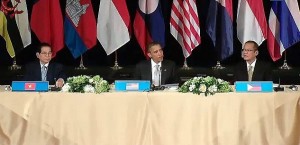What is it that captivates our attention when it comes to US elections? Is it the theatre and showmanship? Is it the ‘big ideas’ at stake? Or is it something else entirely?
Sidelined as spectators, Australians are spoilt for access to election coverage. Our media is soon to be saturated with campaign updates and analysis – from the latest gaffes and misdemeanors, to glimpses of stirring rhetoric and countdowns.
If previous elections are anything to go by, it’s only a matter of time until repeats of American television shows are interrupted for crosses to Mitt Romney or President Obama on the campaign trail; it’s already happening before our eyes.

That our nation is so immersed in American culture is a testament to the soft power credentials of the US. If you think we’re not, try turning on the television once in a while. We celebrate Australian content, and rightly so, but there’s no questioning the prominence of American material on our screens.
Similarly, we continue to lap up US election coverage that is served to us on a platter by the 24-hour news cycle. It seems that we viewers can’t get enough of it, even when Australian coverage relies heavily on US reporting and summaries.
But when it comes to election coverage in Australia, our familiarity with the United States has blurred the boundaries between our two nations and our two distinct ways of life. Our political leaders may espouse views of common heritage and histories, but embroiled in the theatre of an election it often seems as if we too are casting a vote on November 5th.
As the remaining superpower, developments in the U.S are explicitly tied to Australian fates. The Global Financial Crisis, the fall out from the September 11 attacks and the subsequent wars are obvious examples.
‘What happens in the US economy matters to the world economy and it matters to us,’ said Prime Minister Julia Gillard on Friday.
We know this ostensibly, but amid all the commotion of a US election you may be forgiven for forgetting that Australia and the United States are profoundly different nations when it comes to domestic political realities.
We need only look to the divisive issues in the United States to see the stark differences in our national debates. Wedge issues like the right to bear arms, health care, student loans, and the centrality of abortion to party politics are divorced from the realities of mainstream politics in Australia. In many cases they seem plain ridiculous.
The ideological battle over Healthcare in the United States continues to dismay much of the Australian public. The same applies for America’s relationship with guns, which seems absurd to most Australians and indeed most of the world. Even with the gun related tragedies of the recent months, there’s next to no possibility that Romney or Obama will raise the issue in their campaigns for fear of an electoral revolt.
On average, Australia has fifteen firearms per one hundred people, while in the US this number reaches eighty eight. Unsurprisingly, 11.5 per cent of homicides in Australia are linked to firearms compared to 60 per cent in the US.
Obama is also taking overdue student loan reforms to the election of which versions have been in place in Australia and most of the Western world for decades.
As Peter Hartcher, political and international editor at the Sydney Morning Herald says, our coverage of the U.S election would be different if we ‘assess the US as a foreign country’.
‘As soon as we take that view, the question changes dramatically. It’s not about which candidate you prefer, but which is likely to be better for Australia’s national interests?’
Coverage of US elections have always strived to serve two purposes: to report on political developments and to translate these for Australian interests. In recent elections, the latter has too often been swept aside by election fanfare and the cult of personality.
Perhaps it’s time we stepped back from the theatre and voyeurism of US election coverage and asked what’s really at stake for Australians? How do the platforms of both parties impact Australia’s strategic standing in the world, particularly in the Asian century?
While the election to date has focused almost exclusively on the challenges facing the domestic economy, there is still much at stake in when it comes to Australian interests.
‘This year’s US election results could be crucial in determining our future strategic policies,’ says Andrew Carr from the Strategic and Defence Studies Centre at ANU’s College of Asia and the Pacific.
Mitt Romney’s election promises have already raised concerns in Canberra as to how Australia will balance its trade relations with Beijing and its strategic alliance with the US should he be elected.
‘Unless China changes its ways, on day one of my Presidency I will designate it a currency manipulator and take appropriate counteraction,’ said Romney.
With the election result sure to have an impact on Australia’s involvement in Afghanistan, our relationship with China, and state of the global economy, it’s time that we too payed more attention to the national interest.
Perhaps our leaders aren’t the ones tripping over themselves when it comes to US politicians.
Henry Belot is a Masters of Global Media student at The University of Melbourne. You can follow him on Twitter: @Henry_Belot






